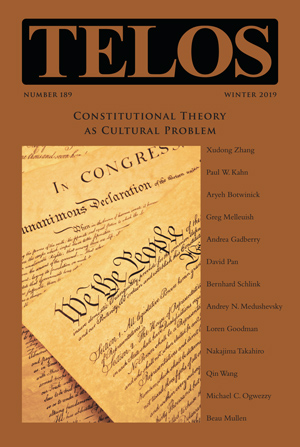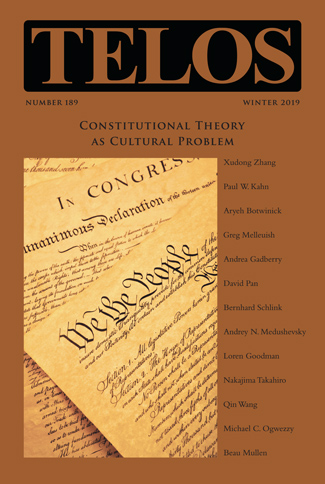By Telos Press · Thursday, November 26, 2020 In today’s episode of the Telos Press Podcast, Camelia Raghinaru talks with Beau Mullen about his article “Democratic and Republican Coups,” from Telos 189 (Winter 2019). An excerpt of the article appears here. If your university has an online subscription to Telos, you can read the full article at the Telos Online website. For non-subscribers, learn how your university can begin a subscription to Telos at our library recommendation page. Purchase a print copy of Telos 189 in our online store.
Listen to the podcast here.
Continue reading →
By Andrey N. Medushevsky · Thursday, January 2, 2020 Andrey N. Medushevsky’s “Law and Revolution: The Impact of Soviet Legitimacy on Post-Soviet Constitutional Transformation” appears in Telos 189 (Winter 2019), a special issue on constitutional theory. Read the full article at the Telos Online website, or purchase a print copy of the issue in our online store. Individual subscriptions to Telos are available in both print and online formats.
 The systematic investigation of the Russian revolutionary tradition in comparative, historical, and functional perspective provides the opportunity to understand its impact on the creation of the modern world and the contemporary social and political system. This article discusses the meaning, formation, and evolution of the Soviet project—the concept and practice of social and legal reorganization in Russia inspired by Marxist philosophical ideas and fulfilled during the period from the Bolshevik Revolution of 1917 until the collapse of the Soviet regime in 1991. Employing a cognitive theoretical approach in historical studies, the author examines the role of Communist myth in the formation of the Soviet state, the ideological and legal grounds of one-party dictatorship, the nature of nominal constitutionalism, and the role of institutional continuity in the formation of the current political system. He shows the place of the permanent grounds (ideology, nominal constitutionalism, and dictatorial impetus) as well as the place of changing parameters of the project (Soviet, federative, and class-oriented regulation) regarding their formal and informal influence on the political regime’s legitimacy and the cumulative impact on the system’s transformation and failure. In this context, the author discusses the evolution of the legitimating formula of the political regime from Tsarist times to the collapse of the Soviet regime, as represented in ideological programmatic, nominal Soviet constitutionalism (1918, 1924, 1936, and 1977 Soviet constitutions) and changing practices of the social mobilization. That makes possible the general evaluation of the revolutionary heritage and its influence on the current post-Soviet ideological priorities, political system, legal transformation, and prospects for its modernization. The systematic investigation of the Russian revolutionary tradition in comparative, historical, and functional perspective provides the opportunity to understand its impact on the creation of the modern world and the contemporary social and political system. This article discusses the meaning, formation, and evolution of the Soviet project—the concept and practice of social and legal reorganization in Russia inspired by Marxist philosophical ideas and fulfilled during the period from the Bolshevik Revolution of 1917 until the collapse of the Soviet regime in 1991. Employing a cognitive theoretical approach in historical studies, the author examines the role of Communist myth in the formation of the Soviet state, the ideological and legal grounds of one-party dictatorship, the nature of nominal constitutionalism, and the role of institutional continuity in the formation of the current political system. He shows the place of the permanent grounds (ideology, nominal constitutionalism, and dictatorial impetus) as well as the place of changing parameters of the project (Soviet, federative, and class-oriented regulation) regarding their formal and informal influence on the political regime’s legitimacy and the cumulative impact on the system’s transformation and failure. In this context, the author discusses the evolution of the legitimating formula of the political regime from Tsarist times to the collapse of the Soviet regime, as represented in ideological programmatic, nominal Soviet constitutionalism (1918, 1924, 1936, and 1977 Soviet constitutions) and changing practices of the social mobilization. That makes possible the general evaluation of the revolutionary heritage and its influence on the current post-Soviet ideological priorities, political system, legal transformation, and prospects for its modernization.
Continue reading →
By Xudong Zhang and David Pan · Monday, December 16, 2019 Telos 189 (Winter 2019), a special issue on Constitutional Theory as Cultural Problem, edited by Xudong Zhang and David Pan, is now available for purchase in our store. Individual subscriptions to Telos are also available in both print and online formats.
 The challenges faced by the liberal democratic model of government in the twenty-first century have made constitutional theory into an urgent topic of global concern. Both the second Iraq war and the revolutions of the Arab Spring frustrated hopes of an easy global trajectory toward liberal democracy. If there was the hope that liberation would mean the establishment of liberal constitutional norms, the result has been that emancipation from tyranny does not naturally lead in a particular political direction. Meanwhile, established liberal democracies, from the United States to Europe to India, are facing upheavals that have prompted many to question the stability of the model itself, leading to the need to revise a constitutional theory that up to now has been built around the liberal democratic model. While the constitutional state, as theory and practice in modern Europe, North America, and Asia, continues to be the common point of reference, its stability and legitimacy can no longer be taken for granted, thus requiring renewed thinking about its history and cultural foundations. The challenges faced by the liberal democratic model of government in the twenty-first century have made constitutional theory into an urgent topic of global concern. Both the second Iraq war and the revolutions of the Arab Spring frustrated hopes of an easy global trajectory toward liberal democracy. If there was the hope that liberation would mean the establishment of liberal constitutional norms, the result has been that emancipation from tyranny does not naturally lead in a particular political direction. Meanwhile, established liberal democracies, from the United States to Europe to India, are facing upheavals that have prompted many to question the stability of the model itself, leading to the need to revise a constitutional theory that up to now has been built around the liberal democratic model. While the constitutional state, as theory and practice in modern Europe, North America, and Asia, continues to be the common point of reference, its stability and legitimacy can no longer be taken for granted, thus requiring renewed thinking about its history and cultural foundations.
Continue reading →
|
|




